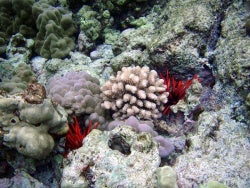 Rod Fujita, Ph.D., is a scientist in the Oceans program at Environmental Defense Fund.
Rod Fujita, Ph.D., is a scientist in the Oceans program at Environmental Defense Fund.
 Coral reefs aren’t just pretty places for scuba divers (although they do bring in billions of tourist dollars). These rich ecosystems supply the inhabitants of coral reef countries with the fish that they depend on as their main source of protein. Coral reefs, like rainforests, are also treasure troves of biodiversity that may hold the keys to fighting diseases like cancer and arthritis. Human wellbeing is tightly bound to the health of coral reefs.
Coral reefs aren’t just pretty places for scuba divers (although they do bring in billions of tourist dollars). These rich ecosystems supply the inhabitants of coral reef countries with the fish that they depend on as their main source of protein. Coral reefs, like rainforests, are also treasure troves of biodiversity that may hold the keys to fighting diseases like cancer and arthritis. Human wellbeing is tightly bound to the health of coral reefs.
Unfortunately, coral reefs are in trouble, and climate change plays a major role.
This week, marine biologists, reef managers, fishermen and divers are gathered in Fort Lauderdale to share the latest information on coral reef biology and conservation. On the opening day of the symposium, NOAA scientists released a report on the state of coral reef ecosystems in the U.S. The dense 569-page document is sobering. Some key findings:
- Branching corals that once formed "vast stands" across the Atlantic and Caribbean have declined as much as 90 percent at some sites.
- Populations of reef fish are "largely depleted" in the Atlantic and in "poor condition" in the Pacific.
- The overall condition of reefs has declined over the past 25 years, and threats are increasing.
What’s behind these problems? The scientists and managers surveyed identified various local threats to individual reefs, but climate change emerged as a widespread concern. More than two-thirds of U.S. reef jurisdictions reported that threats from climate change had increased over the past 10-25 years. The report’s authors highlighted growing worry about ocean acidification (caused by increased CO2 in the atmosphere), which could "prevent future reef growth altogether."
To minimize the effects of warming and acidification on coral reefs, we must decrease our emissions of CO2 and other greenhouse gases. But coral reefs face other threats, as well, such as disease, coastal development, tourism and recreation, fishing, and invasive species. Protecting the world’s remaining coral reefs will require action on many fronts.
The situation is grim, but all is not lost. We can help coral reefs withstand the stresses of climate change by reducing other direct threats. Corals are sensitive but also can be very resilient – if we can reduce the stresses that they face.










4 Comments
It would be interesting to see a map of where coral has been depleted. Perhaps there’s a geographic trend that can help shed light on a specific causal mechanism.
We have it all wrong. The slogan should not be “Save the Planet”, it should be, “Save the Human Race”.
Why? Because the planet does not need us to save it from anything. Our beautiful home has been subjected to billions of years of assault from forces far beyond ANYTHING we meager little humans could ever imagine.
One volcano (one..as in not 2)emits more dust, debris and C02 then the entire carbon emmisions from our race year-to-date. A single strike from a fairly sizeable asteroid has the potential to leave our planet in total and complete ruin (from a human perspective) for hundreds of millions of years(carbon offsets will not protect you).
The point here? This “Save the Planet” nonsense is nothing more then a devious plan to remove more money from our wallets. So, before you dig deeply into your bank account and send money to “save our planet” think of P.T Barnham (spelling?).
The planet doesnt need your money or your help. Why not send that money, or your help, to a better place like your local food bank, church or other local entity that actually helps people survive by providing the basics of food and shelter.
The planet is bigger, tougher and more resilient then us all. It will be here LONG after catchy little slogans like “Save the Planet”.
muffdvr1,
>We have it all wrong. The slogan should not be “Save the Planet”, it should be, “Save the Human Race”.
You’re actually 100% right on this, but not in the way you think. If we do nothing to stop global warming, the human race is what is at risk. Once we are gone, the greenhouse gas emissions will stop and the Earth will recover.
>One volcano (one..as in not 2)emits more dust, debris and C02 then the entire carbon emmisions from our race year-to-date. A single strike from a fairly sizeable asteroid has the potential to leave our planet in total and complete ruin (from a human perspective) for hundreds of millions of years(carbon offsets will not protect you).
Yeah, yeah. But there are two differences:
1. The probability of catastrophe from global warming is many times greater than the probability of a killer volcano or asteroid.
2. We can do something to stop global warming, but we can’t prevent killer volcanoes or asteroids.
And by the way, in case anyone has the idea that routine volcanic eruptions are the cause of global warming, they are not. Here’s a post that lays out the evidence proving otherwise:
http://blogs.edf.org/climate411/2007/05/21/volcanoes/
>The planet is bigger, tougher and more resilient then us all. It will be here LONG after catchy little slogans like “Save the Planet”.
Again, true, but not in the way you think. The planet will survive – but millions of human beings may die if we don’t take action to stop global warming.
So I’m thrilled I added you to my RSS, otherwise I would have missed this. Thanks for this, and a great 2010 to you.